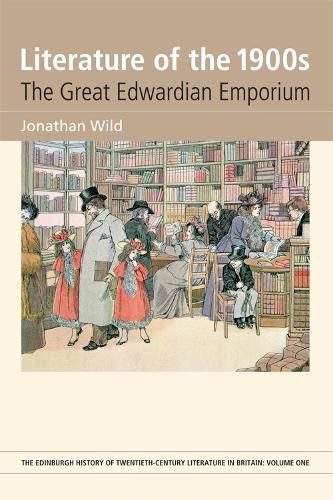Readings Newsletter
Become a Readings Member to make your shopping experience even easier.
Sign in or sign up for free!
You’re not far away from qualifying for FREE standard shipping within Australia
You’ve qualified for FREE standard shipping within Australia
The cart is loading…






Challenges conventional views of the Edwardian period as either a hangover of Victorianism or a bystander to literary modernism
In this ground-breaking study, Jonathan Wild investigates the literary history of the Edwardian decade. This period, long overlooked by critics, is revealed as a vibrant cultural era whose writers were determined to break away from the stifling influence of preceding Victorianism. In the hands of this generation, which included writers such as Arnold Bennett, Joseph Conrad, E. M. Forster, Beatrix Potter, and H.G. Wells, the new century presented a unique opportunity to fashion innovative books for fresh audiences. Wild traces this literary innovation by conceptualising the focal points of his study as branches of one of the new department stores that epitomized Edwardian modernity. These ‘departments’ - war and imperialism, the rise of the lower middle class, children’s literature, technology and decadence, and the condition of England - offer both discrete and interconnected ways in which to understand the distinctiveness and importance of the Edwardian literary scene. Overall, The Great Edwardian Emporium offers a long-overdue investigation into a decade of literature that provided the cultural foundation for the coming century.
$9.00 standard shipping within Australia
FREE standard shipping within Australia for orders over $100.00
Express & International shipping calculated at checkout
Challenges conventional views of the Edwardian period as either a hangover of Victorianism or a bystander to literary modernism
In this ground-breaking study, Jonathan Wild investigates the literary history of the Edwardian decade. This period, long overlooked by critics, is revealed as a vibrant cultural era whose writers were determined to break away from the stifling influence of preceding Victorianism. In the hands of this generation, which included writers such as Arnold Bennett, Joseph Conrad, E. M. Forster, Beatrix Potter, and H.G. Wells, the new century presented a unique opportunity to fashion innovative books for fresh audiences. Wild traces this literary innovation by conceptualising the focal points of his study as branches of one of the new department stores that epitomized Edwardian modernity. These ‘departments’ - war and imperialism, the rise of the lower middle class, children’s literature, technology and decadence, and the condition of England - offer both discrete and interconnected ways in which to understand the distinctiveness and importance of the Edwardian literary scene. Overall, The Great Edwardian Emporium offers a long-overdue investigation into a decade of literature that provided the cultural foundation for the coming century.